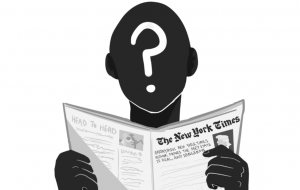Anonymity is still valid
October 24, 2018
The New York Times opinion section has been recently overshadowed with real-world news being too inflammatory to ignore. However, this trend reversed earlier this month when their own opinion page became front page news. A senior official within the Trump administration wrote an anonymous op-ed describing their resistance to the President’s agenda from within the White House, making major waves across the American news cycle.
But beyond the momentary fervor, the anonymous opinion editorial raises some interesting ethical questions. First and foremost, should a media source be able to publish incendiary material anonymously, and if so, does it discredit the validity?
The First Amendment guarantees the freedom of speech and press; this alone should be enough in protecting the author’s choice of writing an anonymous opinion article. If the government made an exception, forcing the New York Times to reveal the author, then these actions would set a precedent, weakening the power of the First Amendment, and thus the Constitution.
Beyond the First Amendment, most people who are in a similar situation to that of the author, providing inside information to the world, are uncomfortable giving their names as it will immediately have adverse effects. If an anonymous whistleblower, or a person who exposes any kind of information or activity that is deemed illegal not correct within an organization, were exposed, they would be instantly fired and blacklisted. Just because certain information was obtained from an anonymous source does not invalidate the legitimacy of the article.
For example, Mark Felt, the associate director of the Federal Bureau of Investigation, provided anonymous, yet groundbreaking information to the Washington Post. This information blew open the Watergate Scandal and ultimately led to the resignation of President Richard Nixon. Similarly, Robert McCarthy, a field solicitor for the United States Department of the Interior, undisclosed the Department of Interior’s misuse of three and a half billion dollars.
Publicizing an anonymous article or accusation may be an integral part of gaining retribution for someone who has gone through a traumatic experience. The “Me Too” movement has progressively grown since its inception in October 2017. Vox reports, “over the past year, more than 200 powerful people – celebrities, politicians, CEOs, and others – have been the subject of sexual harassment or assault allegations.” The majority of these allegations were put forth anonymously, yet despite challenges, have been proven true. Anonymity helped to provide victims the courage to step forward without the potential backlash from their persecutor. This allowed for more people to tell their valid story, which made the movement more powerful. The sheer number of allegations brought attention to the situation.
Few people initially believed that the beloved television and comedian star Bill Cosby would have drugged and sexually assaulted innocent and unsuspecting women had it not been for approximately sixty women who came forward. Many of those initial victims came forward anonymously due to fear of the stigma, potential repercussions, and not being believed. This movement recently led to Bill Cosby’s conviction in a federal court, proving that the anonymous accounts of many women were true.
Additionally, many people are afraid to speak out against venerated institutions unless they can do so anonymously. For many years, the Catholic Church has been covering up its history of indiscretions. The victims felt conflicted about coming forward and wished to remain anonymous. Many priests were relocated to other parishes instead of being punished for their crimes, ultimately leading to the Catholic Church setting aside over three billion dollars for future settlements according to several news sources. This story was enabled by undisclosed sources.
The New York Times, as big as it is, had already vetted the author of the article before they decided to publish it. There is no incentive for them to publish a false article as the repercussions of doing so are severe in the long run. The Times’ reputation would gravely suffer if the stories were proved untrue. Furthermore, there are laws protecting against libel and slander, so even if an outlet did want to publish something particularly scandalous, they would be limited by the law. Therefore, publishing an op-ed article anonymously should not jeopardize its validity in any way.


